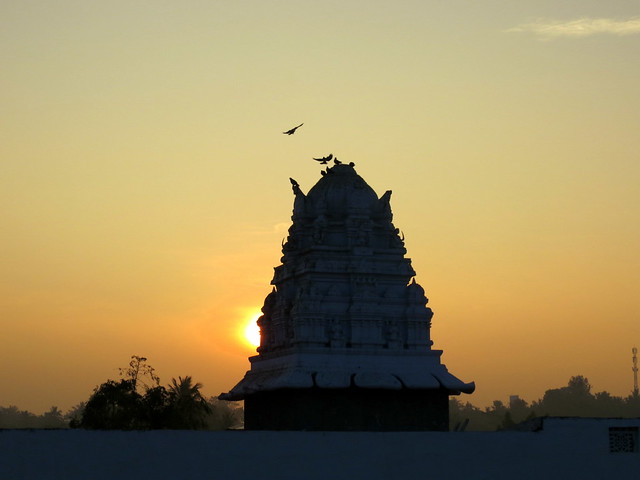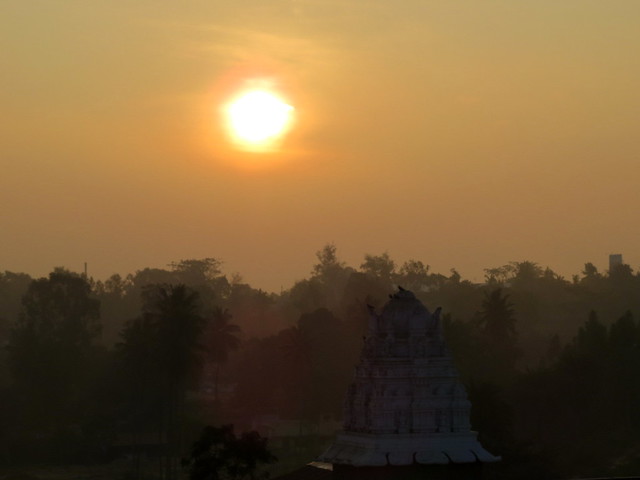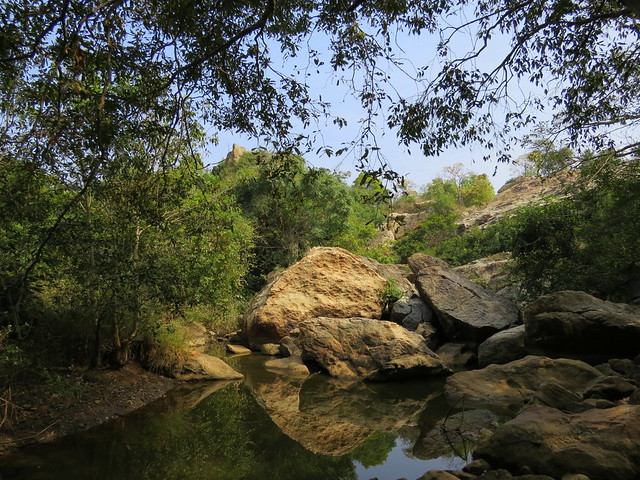Gulakmale/Thottikallu trip, 281214
December 28, 2014
Email to bngbirds egroup:
I decided on Gulakmale as a birding destination as I have not been there for a long while now, for Saturday, the 27th December, 2014, and it proved to be a very good decision. The group this time was a small one, consisting of Chandan, Gayatri, Job, Mani, Prem and myself.
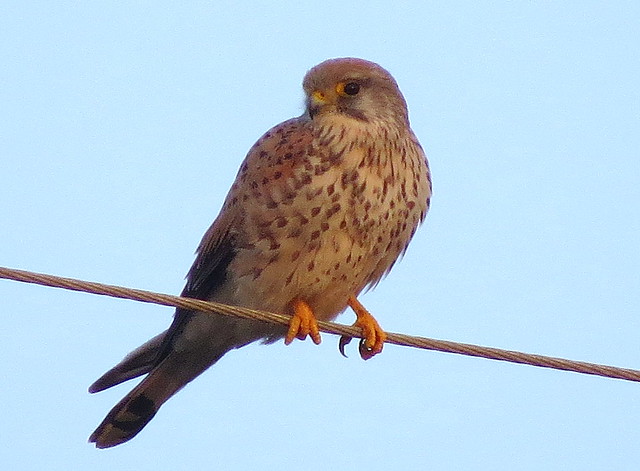 Black Kites building a "powerful" nest.
Black Kites building a "powerful" nest.
 We fanned out at Gulakmale kere,
We fanned out at Gulakmale kere,
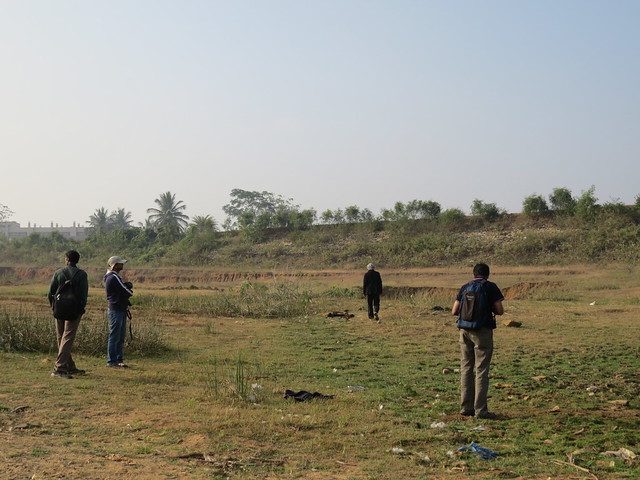

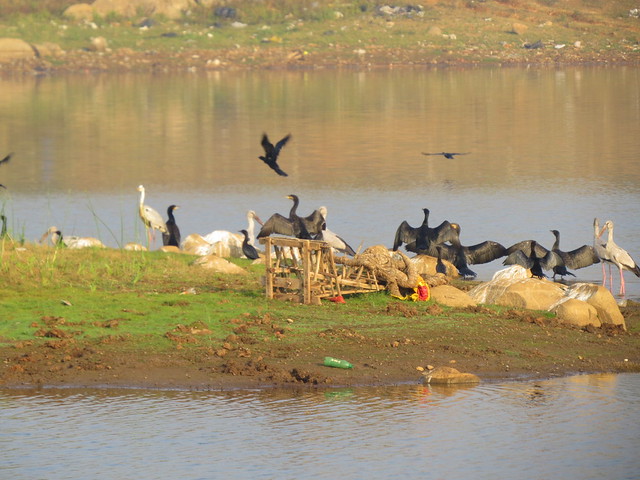 noticing that much of the scrub land facing the kere has been cleared and is now a budding residential layout, as is happening at many other places, including Turahalli.
noticing that much of the scrub land facing the kere has been cleared and is now a budding residential layout, as is happening at many other places, including Turahalli.
 The lake was not full, but there was enough water for fishers, divers and waders...and we were very happy to watch the different methods of getting bird-breakfast. Surprisingly, we did not see any Coots or Grebes...or any ducks, not even the more common Spot-billed ones. Many Asian Openbills were present,
The lake was not full, but there was enough water for fishers, divers and waders...and we were very happy to watch the different methods of getting bird-breakfast. Surprisingly, we did not see any Coots or Grebes...or any ducks, not even the more common Spot-billed ones. Many Asian Openbills were present,
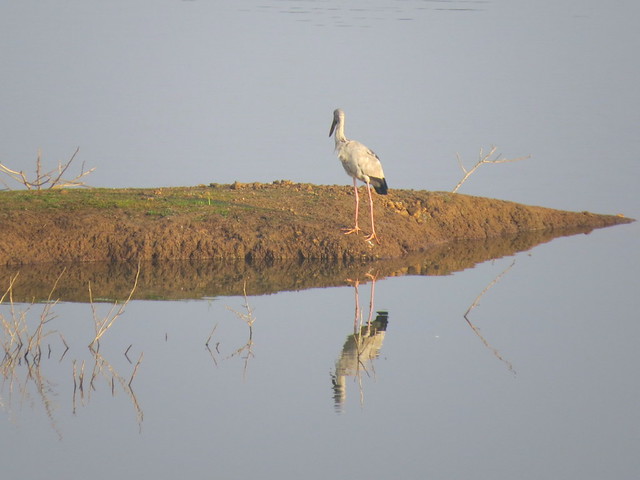
 and we observed that different parts of the kere seemed to be earmarked for different birds...the Openbills in one area, the Cormorants in another, and the Brahminy and Common Kites floated in the air above, occasionally swooping down with varying degrees of success. Two Pied Kingfishers,
and we observed that different parts of the kere seemed to be earmarked for different birds...the Openbills in one area, the Cormorants in another, and the Brahminy and Common Kites floated in the air above, occasionally swooping down with varying degrees of success. Two Pied Kingfishers,
 too, seemed to have divided up the water into two parts to fish in, and it was a delight to see them hovering intently and then suddenly zooming vertically into the water.
too, seemed to have divided up the water into two parts to fish in, and it was a delight to see them hovering intently and then suddenly zooming vertically into the water.
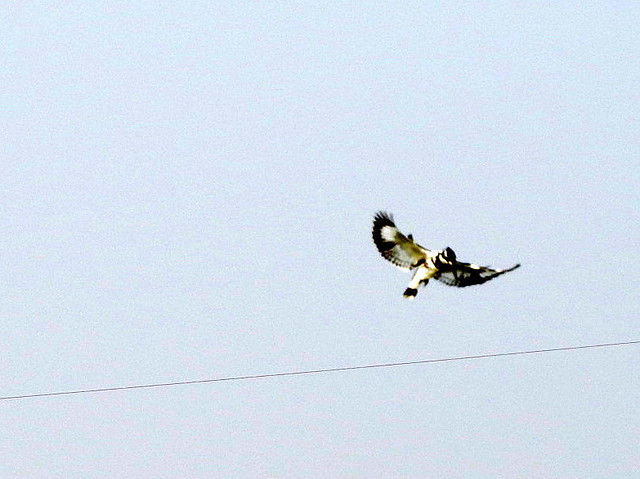
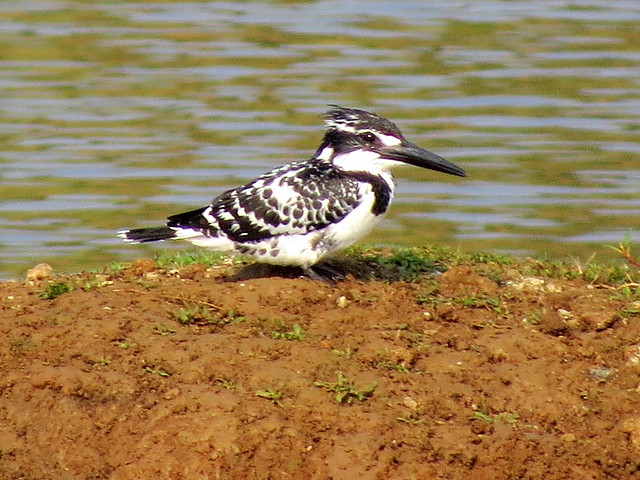 Two varieties of Sandpiper, and some Little Ringed Plovers, wandered along the water's edge, as did one Yellow Wagtail.
Two varieties of Sandpiper, and some Little Ringed Plovers, wandered along the water's edge, as did one Yellow Wagtail.
 When we had looked (and clicked) to our hearts' content, we went further down the road, to the Thottikallu Falls (TK Falls) area,
When we had looked (and clicked) to our hearts' content, we went further down the road, to the Thottikallu Falls (TK Falls) area,
 and walked from the end of the road, past the Thottikallu Muniswara temple
and walked from the end of the road, past the Thottikallu Muniswara temple
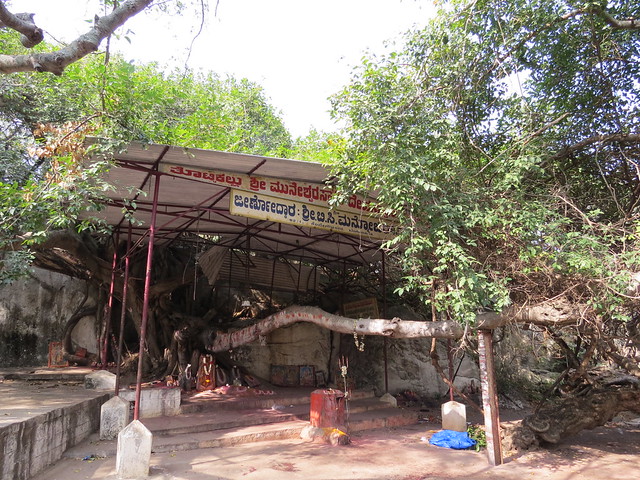 (where the blood of sacrificed chickens was still staining the granite flagstones).
(where the blood of sacrificed chickens was still staining the granite flagstones).
 Warblers, a Flameback, and Paradise Flycatchers rewarded us, amongst other birds. Some raptors sightings, and the resultant debate on id's, kept us busy...and happy. A Grey Wagtail played Narcissus at the edge of the water.
Warblers, a Flameback, and Paradise Flycatchers rewarded us, amongst other birds. Some raptors sightings, and the resultant debate on id's, kept us busy...and happy. A Grey Wagtail played Narcissus at the edge of the water.
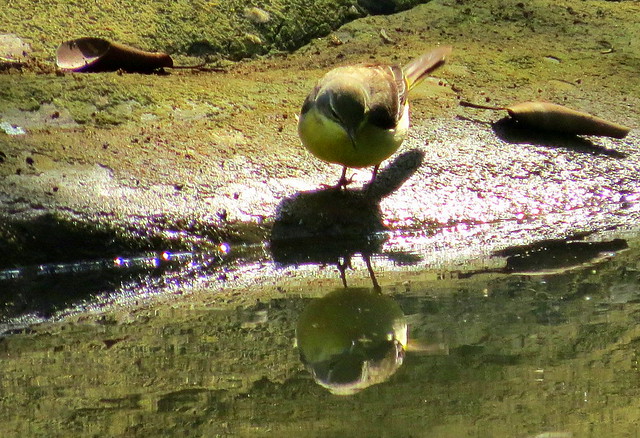 While we were certainly not "tick-birding", a species count of 80+ at the end of the outing was indeed satisfying!
The stream is very sparse at this time of the year, and some beautiful, bright green algae decorated the stones near the temple.
While we were certainly not "tick-birding", a species count of 80+ at the end of the outing was indeed satisfying!
The stream is very sparse at this time of the year, and some beautiful, bright green algae decorated the stones near the temple.
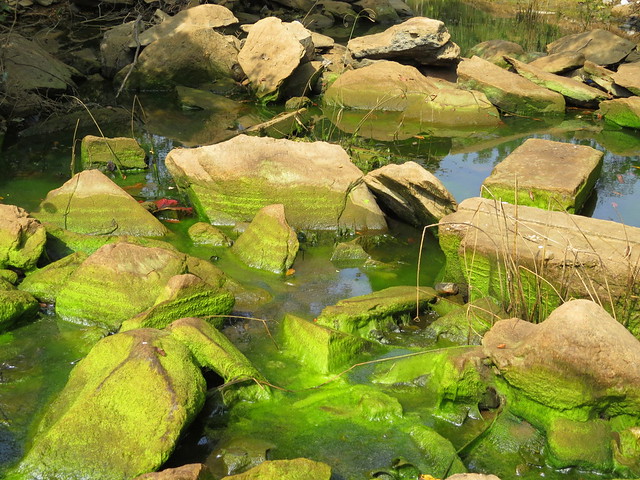
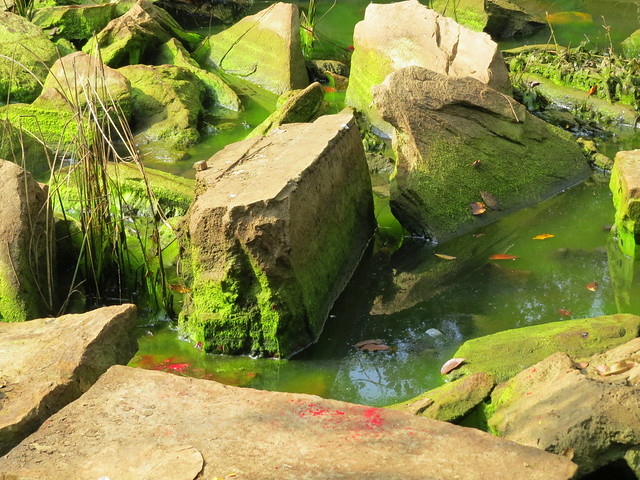 It was sad to see the area so full of trash. Why must temple rituals now mean the thoughtless littering of the place? Cleanliness is definitely not next to godliness in our country.
It was sad to see the area so full of trash. Why must temple rituals now mean the thoughtless littering of the place? Cleanliness is definitely not next to godliness in our country.
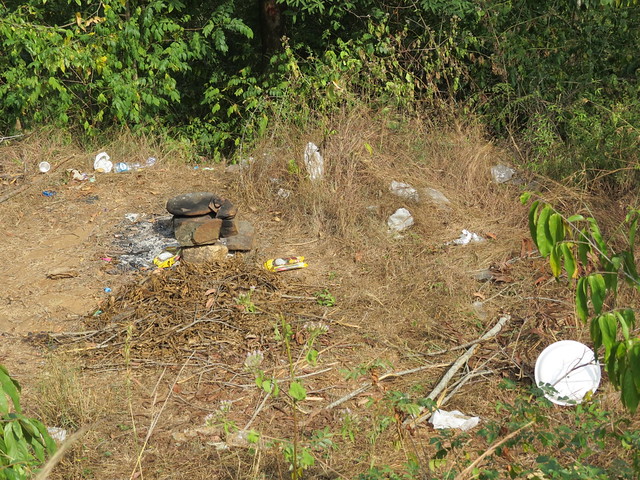 The third Sunday of January will of course, be the non-competitive (and still fun to me!) Bangalore Bird Race. But if I am to volunteer for the February 3rd Sunday outing, I'll be glad to go with everyone to Gulakmale!
Many thanks to Praveen J and Amith Kumar who invariably help with the id'ing, especially when our descriptions and shots may not be very clear!
My photos from the trip are on my FB album at
https://www.facebook.com/deemopahan/media_set?set=a.10152662825183878.1073742323.587058877&type=3
Next up, a very enjoyable plant, tree and insect walk which some of us did in the Arikere Reserve Forest this morning (Sunday, 28th Dec 2014), with everyone, from Ganesh and Janani, to 6-year old Pranav, chipping in with information! I am hoping that the egroup continuesto be fordescribing all kinds of nature trails and not just birds :D
Cheers, Deepa.
Birds:
Avadavat, Red
Babbler, Jungle
Babbler, Yellow-billed
Barbet, Coppersmith
Barbet, White-cheeked
Bee-eater, Green
The third Sunday of January will of course, be the non-competitive (and still fun to me!) Bangalore Bird Race. But if I am to volunteer for the February 3rd Sunday outing, I'll be glad to go with everyone to Gulakmale!
Many thanks to Praveen J and Amith Kumar who invariably help with the id'ing, especially when our descriptions and shots may not be very clear!
My photos from the trip are on my FB album at
https://www.facebook.com/deemopahan/media_set?set=a.10152662825183878.1073742323.587058877&type=3
Next up, a very enjoyable plant, tree and insect walk which some of us did in the Arikere Reserve Forest this morning (Sunday, 28th Dec 2014), with everyone, from Ganesh and Janani, to 6-year old Pranav, chipping in with information! I am hoping that the egroup continuesto be fordescribing all kinds of nature trails and not just birds :D
Cheers, Deepa.
Birds:
Avadavat, Red
Babbler, Jungle
Babbler, Yellow-billed
Barbet, Coppersmith
Barbet, White-cheeked
Bee-eater, Green
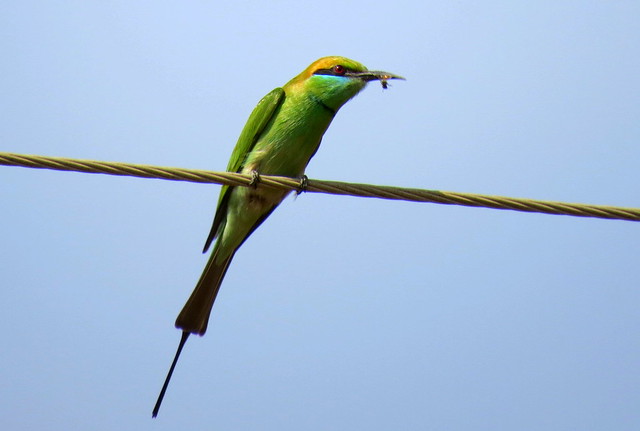 Bulbul, Red-vented
Bulbul, Red-whiskered
Bulbul, White-browed
Bushchat, Pied
Bushlark, Indian
Bulbul, Red-vented
Bulbul, Red-whiskered
Bulbul, White-browed
Bushchat, Pied
Bushlark, Indian
 Bushlark, Jerdon's
Cisticola, Zitting
Cormorant, Great
Cormorant, Indian
Cormorant, Little
Bushlark, Jerdon's
Cisticola, Zitting
Cormorant, Great
Cormorant, Indian
Cormorant, Little
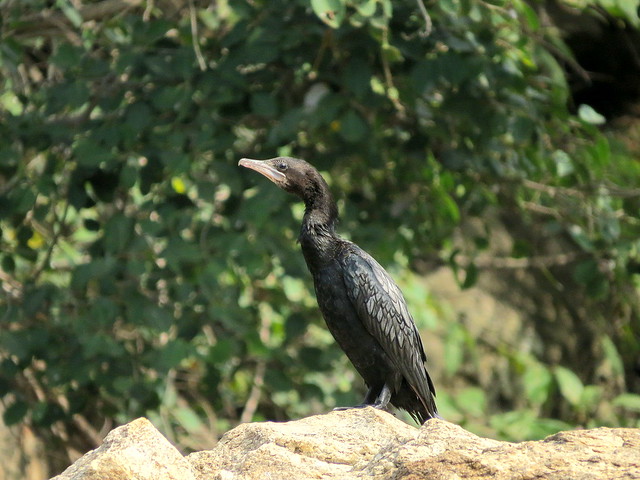 Coucal, Greater
Crow, House
Crow, Jungle
Dove, Laughing
Dove, Spotted
Drongo, Ashy
Drongo, Black
Drongo, White-bellied
Coucal, Greater
Crow, House
Crow, Jungle
Dove, Laughing
Dove, Spotted
Drongo, Ashy
Drongo, Black
Drongo, White-bellied
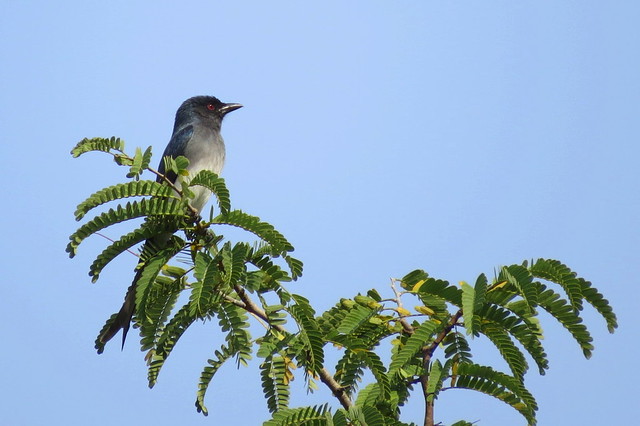 Eagle, Booted
Eagle, Short-toed Snake
Eagle, Tawny
Egret, Cattle
Egret, Intermediate
Eagle, Booted
Eagle, Short-toed Snake
Eagle, Tawny
Egret, Cattle
Egret, Intermediate
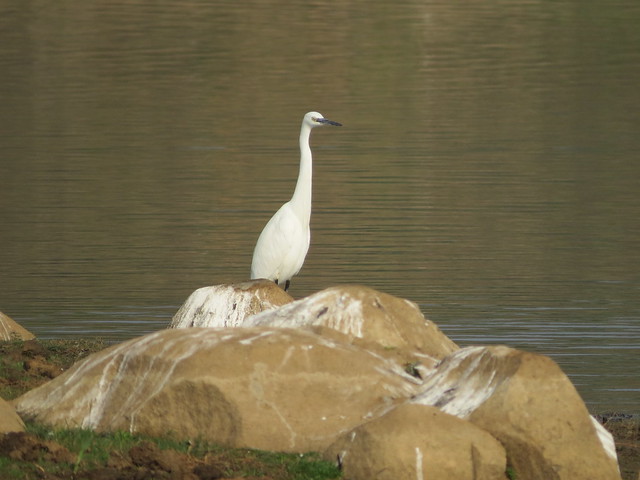 Egret, Little
Egret, Great
Flameback, Black-rumped
Flowerpecker, Pale-billed
Flycatcher, Asian Brown
Flycatcher, Asian Paradise
Flycatcher, White-browed Fantail
Francolin, Grey (heard)
Heron, Grey
Heron, Indian Pond
Heron, Purple
Honey-buzzard, Oriental
Hoopoe, Indian (Prem)
Iora, Common
Kestrel, Common
Kingfisher, Pied
Egret, Little
Egret, Great
Flameback, Black-rumped
Flowerpecker, Pale-billed
Flycatcher, Asian Brown
Flycatcher, Asian Paradise
Flycatcher, White-browed Fantail
Francolin, Grey (heard)
Heron, Grey
Heron, Indian Pond
Heron, Purple
Honey-buzzard, Oriental
Hoopoe, Indian (Prem)
Iora, Common
Kestrel, Common
Kingfisher, Pied
 Kingfisher, White-throated
Kite, Black
Kite, Brahminy
Kingfisher, White-throated
Kite, Black
Kite, Brahminy
 Koel, Asian
Lark, Ashy-crowned Sparro
Leafbird, Golden-fronted
Martin, Dusky Crag
Minivet, Small
Munia, Tricoloured
Myna, Common
Myna, Jungle
Openbill, Asian
Oriole, Black-hooded
Oriole, Black-naped
Oriole, Eurasian Golden
Parakeet, Rose-ringed
Pigeon, Blue Rock
Pipit, Paddyfield
Plover, Little Ringed
Koel, Asian
Lark, Ashy-crowned Sparro
Leafbird, Golden-fronted
Martin, Dusky Crag
Minivet, Small
Munia, Tricoloured
Myna, Common
Myna, Jungle
Openbill, Asian
Oriole, Black-hooded
Oriole, Black-naped
Oriole, Eurasian Golden
Parakeet, Rose-ringed
Pigeon, Blue Rock
Pipit, Paddyfield
Plover, Little Ringed
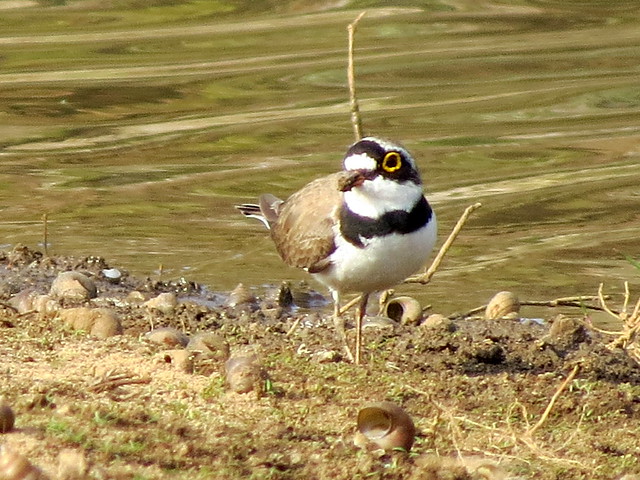
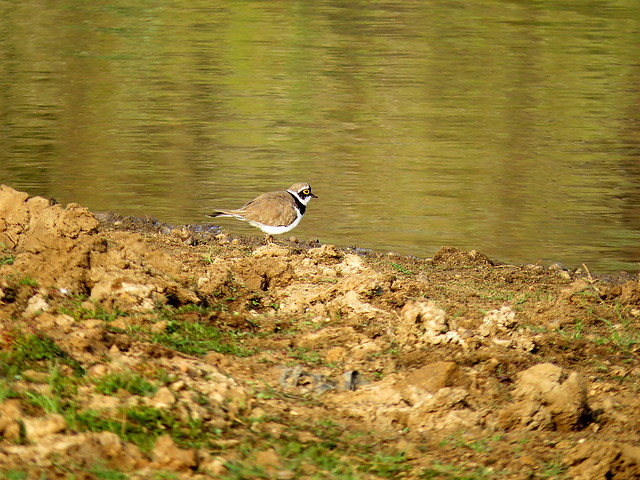 Prinia, Ashy
Robin, Indian
Prinia, Ashy
Robin, Indian
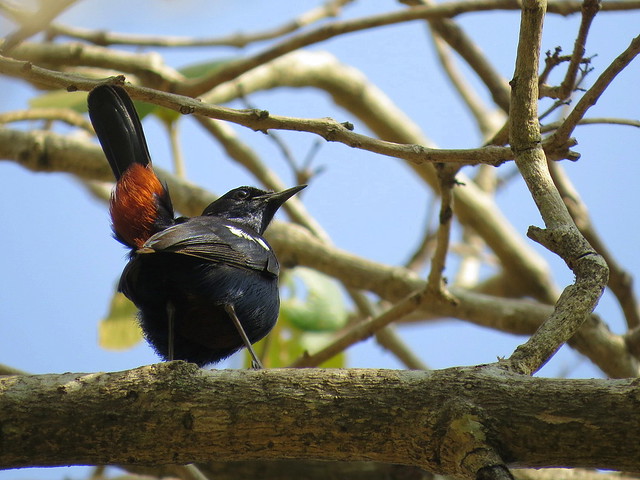 Robin, Oriental Magpie
Sandpiper, Green
Sandpiper, Wood
Shrike, Bay-backed
Shrike, Long-tailed
Robin, Oriental Magpie
Sandpiper, Green
Sandpiper, Wood
Shrike, Bay-backed
Shrike, Long-tailed
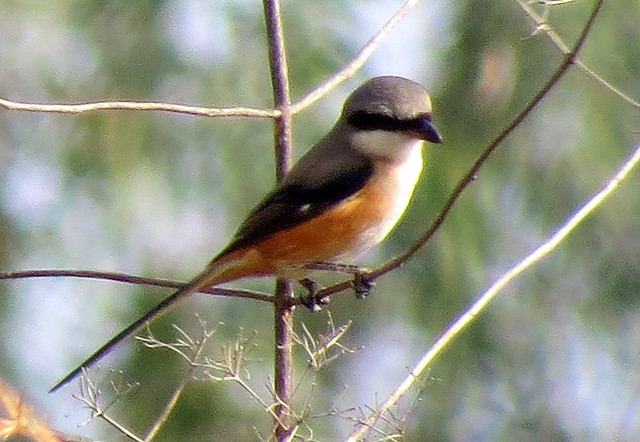 Silverbill, Indian
Sparrow, House
Sunbird, Purple
Sunbird, Purple-rumped
Swallow, Barn
Swallow, Red-rumped
Swallow, Wire-tailed
Swift, House (?)
Tailorbird, Common
Tern, River
Silverbill, Indian
Sparrow, House
Sunbird, Purple
Sunbird, Purple-rumped
Swallow, Barn
Swallow, Red-rumped
Swallow, Wire-tailed
Swift, House (?)
Tailorbird, Common
Tern, River
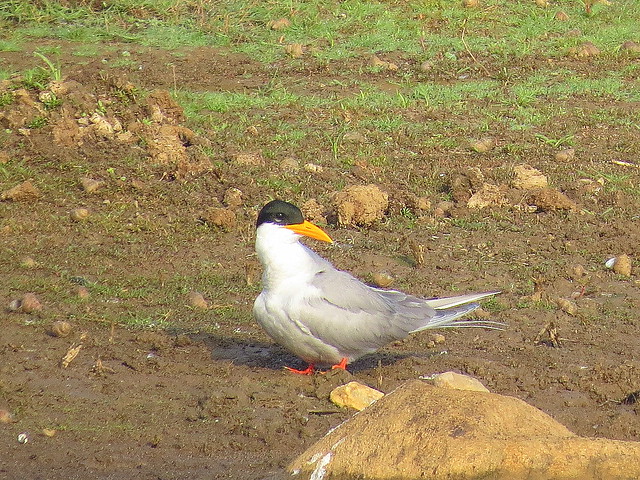 Tit, Great
Wagtail, Grey
Tit, Great
Wagtail, Grey
 Wagtail, White-browed
Wagtail, Yellow
Wagtail, White-browed
Wagtail, Yellow
 Warbler, Blyth's Reed
Warbler, Booted
Warbler, Clamorous Reed
Warbler, Greenish Leaf
Waterhen, White-breasted
Woodswallow, Ashy
Butterflies:
Blues, Various
Castor, Common
Cerulean, Common
Coster, Tawny
Emigrant, Common
Four-ring, Common
Gull, Common
Jezebel, Common
Orange-tip, White
Orange-tip, Yellow
Pioneer
Rose, Common
Rose, Crimson
Tiger, Plain
Wanderer, Indian
Yellow, Three-spot Grass
Warbler, Blyth's Reed
Warbler, Booted
Warbler, Clamorous Reed
Warbler, Greenish Leaf
Waterhen, White-breasted
Woodswallow, Ashy
Butterflies:
Blues, Various
Castor, Common
Cerulean, Common
Coster, Tawny
Emigrant, Common
Four-ring, Common
Gull, Common
Jezebel, Common
Orange-tip, White
Orange-tip, Yellow
Pioneer
Rose, Common
Rose, Crimson
Tiger, Plain
Wanderer, Indian
Yellow, Three-spot Grass

Let me close with this sylvan image of Thottikallu Falls:

